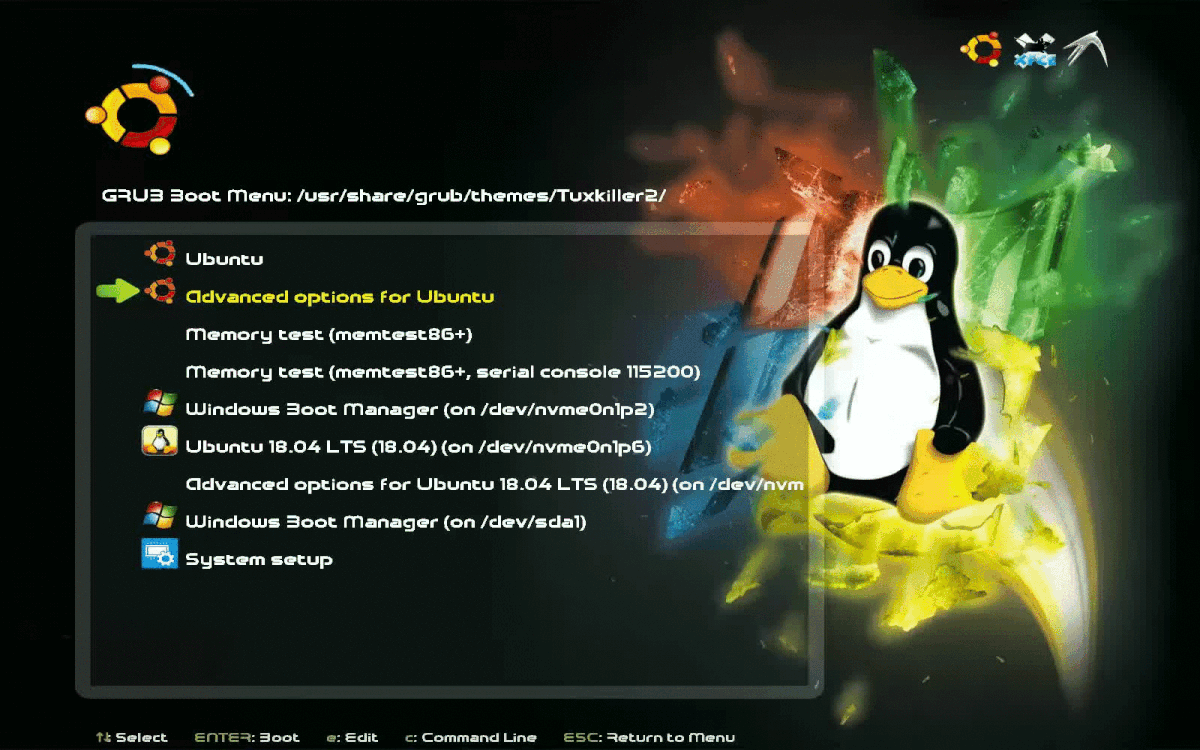Issue
Change Grub's timeout to 1/10th or 1/100th second intervals
Using Grub 2.02 on UEFI system with AMD64 architecture. I'd like to change grub's timeout counter from 1 second intervals to 1/10th second or 1/100th second intervals. The reason is to make gfxmenu circular progress countdown less "choppy". Boot GIF below shows 5 second count down in circular 1 second "chunks":
After successful source code change and recompile, /etc/default/grub would be changed as follows:
- If 1/10th second interval, a 2.5 second countdown would be
GRUB_TIMEOUT=25. - if 1/100th second interval, a 2.5 second countdown would be
GRUB_TIMEOUT=250.
Grub 2.02 Source is 1/2 million lines
I've downloaded the source as described here: how to build grub2 bootloader from it's source and test it with qemu emulator and spent time browsing source files. However there are 477k lines to search:
~/src/grub-2.02$ wc -l **/*
20 asm-tests/arm.S
18 asm-tests/i386-pc.S
4 asm-tests/i386.S
11 asm-tests/mips.S
8 asm-tests/powerpc.S
(... SNIP ...)
115 util/spkmodem-recv.c
477316 total
I've done many bash projects in Ask Ubuntu but this will be my first C/Assembler Linux project. As a "newbie" my thoughts are:
- Which file contains the countdown timer source code?
- How do I change the interval to 1/10th or 1/100th of a second?
- Was putting source code under my home directory a conventional method?
- Any tips on compiling and testing in Virtualbox would be helpful.
Please note only the first question is relevant. The other questions are for answers where the author chooses be more detailed.
Solution
The variable GRUB_TIMEOUT is evaluated in util/grub.d/00_header.in.
if [ "x$GRUB_BUTTON_CMOS_ADDRESS" != "x" ]; then
cat <<EOF
if cmostest $GRUB_BUTTON_CMOS_ADDRESS ; then
EOF
make_timeout "${GRUB_HIDDEN_TIMEOUT_BUTTON}" "${GRUB_TIMEOUT_BUTTON}" "${GRUB_TIMEOUT_STYLE_BUTTON}"
echo else
make_timeout "${GRUB_HIDDEN_TIMEOUT}" "${GRUB_TIMEOUT}" "${GRUB_TIMEOUT_STYLE}"
echo fi
else
make_timeout "${GRUB_HIDDEN_TIMEOUT}" "${GRUB_TIMEOUT}" "${GRUB_TIMEOUT_STYLE}"
fi
Note that this is a script that generates a script which is why it looks rather weird. make_timeout looks like this (ibid.):
make_timeout ()
{
if [ "x${3}" != "x" ] ; then
timeout="${2}"
style="${3}"
elif [ "x${1}" != "x" ] && [ "x${1}" != "x0" ] ; then
# Handle the deprecated GRUB_HIDDEN_TIMEOUT scheme.
timeout="${1}"
if [ "x${2}" != "x0" ] ; then
grub_warn "$(gettext "Setting GRUB_TIMEOUT to a non-zero value when GRUB_HIDDEN_TIMEOUT is set is no longer supported.")"
fi
if [ "x${GRUB_HIDDEN_TIMEOUT_QUIET}" = "xtrue" ] ; then
style="hidden"
verbose=
else
style="countdown"
verbose=" --verbose"
fi
else
# No hidden timeout, so treat as GRUB_TIMEOUT_STYLE=menu
timeout="${2}"
style="menu"
fi
cat << EOF
if [ x\$feature_timeout_style = xy ] ; then
set timeout_style=${style}
set timeout=${timeout}
EOF
if [ "x${style}" = "xmenu" ] ; then
cat << EOF
# Fallback normal timeout code in case the timeout_style feature is
# unavailable.
else
set timeout=${timeout}
EOF
else
cat << EOF
# Fallback hidden-timeout code in case the timeout_style feature is
# unavailable.
elif sleep${verbose} --interruptible ${timeout} ; then
set timeout=0
EOF
fi
cat << EOF
fi
EOF
}
As you can see, it just calls sleep with some options at the end. This command is defined in grub-core/commands/sleep.c. While the sleep command can only sleep in increments of whole seconds, the underlying function grub_millisleep can do better.
It should be easy to patch this function by changing all the grub_millisleep(1000) calls to grub_millisleep(100), but keep in mind that this breaks all uses of sleep. A cleaner option is to add a new option to sleep so the behaviour can be selected on a case-by-case basis.
Answered By - fuz Answer Checked By - Robin (WPSolving Admin)

